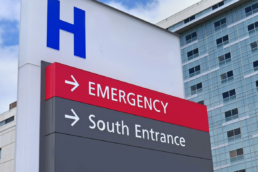J-1 Waivers
Foreign Medical Graduates that enter the U.S. in J-1 status to receive graduate medical education or training, such as to complete their residency or specialty fellowship, are automatically subject to the Immigration and Nationality Act (“INA”) 212(e), otherwise known as the two-year foreign residence requirement.
INA 212(e) requires a J-1 visitor to return to the country in which the alien was a national and resident, or the country where they were a legal permanent resident prior to the beginning of their J-1 status. The J-1 status holder must fulfil two years residence and physical residence requirement prior to being eligible to receive L-1 or H-1B visas.
However, J-1 status holders have several options to waiver the two-year foreign home residency requirement:
- Conrad State 30 Waiver: Each state is able to issue up to 30 waivers to J-1 status holders who will work full-time for three years in an underserved area. Each state has slightly different requirements for the process, but generally the J-1 doctor must enter into a signed contract with a healthcare facility to offer services in an area that has been designated as a Health Professional Shortage Area (“HPSA”), Medically Underserved Area (“MUA”), or Medically Underserved Population (“MUP”) and the healthcare facility will need to show that they were unable to recruit a U.S. doctor for the position. The federal government designates these areas.
Once the state has approved the Conrad State 30 Waiver, the applicant must apply for a waiver to be issued by the Department of State, which will then be forwarded to U.S. Citizenship and Immigration Services (“USCIS”). The applicant will be granted a cap-exempt H-1B in order to fulfill the three years of service required by the Conrad waiver.
There are firm timing deadlines that vary by state, we are happy to assist you in determining your eligibility. Please call Berardi Immigration Law to determine if a potential job offer would qualify for a Conrad State 30 Waiver.
- Health and Human Services Waiver: Health and Human Services (“HHS”) has been designated an interested government agency able to sponsor primary care physicians who will work in a HPSA and involved in a research program or activity which HHS has determined to be “of high priority and of national or international significance in an area of interest”.
Additionally, the J-1 status holder must be an “integral” part of the program or activity “so that the loss of his/her services would necessitate discontinuance of the program, or a major phase of it” and “must possess outstanding qualifications, training and experience well beyond the usually expected accomplishments at the graduate, postgraduate, and residency levels, and must clearly demonstrate the capability to make original and significant contributions to the program”.
Similar to the Conrad State 30 Waiver, J-1 status holders issued an HHS waiver would then receive a waiver from the Department of State, and ultimately a cap-exempt H-1B in order to fulfil the terms of their waiver.
Please call Berardi Immigration Law to determine if you are eligible for an HHS waiver.
- Veterans Administration Waiver: Similar to the HHS Waiver, a Veterans Administration (“VA”) waiver for J-1 status holders offering services to VA hospitals and facilities. Unlike the HHS waiver, there is no research or primary care requirement, and physicians engaged solely in patient care, without regard to specialty are eligible.
VA guidelines provide that a waiver will be granted only where the loss of the J-1 physician’s services would necessitate the discontinuance of a program, or a major phase of it, and that recruitment efforts have failed to locate a U.S. physician to fill the position. There must also be a showing that efforts to recruit a U.S. doctor have failed.
Requests for VA Waivers should be initiated with the Human Resources Department of the VA facility where the J-1 physician is employed. Berardi Immigration Law is happy to assist you in the drafting of your VA Waiver and ensuring that you have the necessary documentation in order to proceed. Please call our office today!
- Appalachian Regional Commission Waiver: The Appalachian Regional Commission (“ARC”) is comprised of more than states on the East Coast and in the South, including areas in Alabama, Georgia, Kentucky, Maryland, Mississippi, New York, North Carolina, Ohio, Pennsylvania, South Carolina, Tennessee, Virginia and West Virginia.
An ARC Waiver is available to doctors who will be practicing in the ARC full-time for at least two years. There must also be a showing of failure to recruit a U.S. doctor to fulfil the position. Separate from the Conrad State 30 Waiver, the ARC Waiver is adjudicated first by the ARC in the state where the physician will practice, and then the ARC issues a recommendation to the Governor to issue the waiver. requires that waiver requests be submitted initially to the ARC contact person in the state of intended employment. Please call Berardi Immigration Law to determine if a potential job offer would qualify for an ARC Waiver.
- Delta Regional Authority Waiver: The Delta Regional Authority (“DRA”) is a federal-state partnership established by law in December 2000 to channel resources, aid and guidance for economic development to the Mississippi Delta region. The DRA includes certain areas in eight states: Alabama, Arkansas, Illinois, Mississippi, Missouri, Kentucky, Louisiana and Tennessee.
The DRA Waiver requires that a J-1 physician commits to work full-time in a DRA area which is either a Health Professional Shortage Area (HPSA), a Medically Underserved Area (MUA) or, in the case of a psychiatrist, in a Mental Health Professional Shortage Area (MHPSA). The potential employer must show that they have actively tried to recruit for U.S. physicians for six months before it can sponsor a J-1 physician.
Please call Berardi Immigration Law for a consultation to determine if you qualify to apply for a DRA Waiver.
- Hardship and Persecution Waivers: Separate from the J-1 physician’s work, USCIS will also grant waivers of the INA 212(e) two-year foreign home residency requirement when a J-1 physician can show hardship to a U.S. citizen family member or risk of persecution if they return home to their country of nationality or residence.
- Hardship Waivers: A hardship waiver is available to a J-1 physician who has a U.S. citizen or permanent resident spouse or children that would suffer “exceptional hardship” if the J-1 physician were required to fulfil the two-year foreign home residency requirement. Some examples of “exceptional hardship” include if the residency requirement would either separate the family or force them to reside together in a war-torn country; or if the U.S. citizen of lawful permanent resident family member were suffering for a life-threatening disease for which treatment was not available in the country where the alien was a citizen. Berardi Immigration Law is happy to review your situation with you to determine your eligibility for this waiver.
- Persecution Waivers: Unlike the Hardship Waiver, a Persecution Waiver does not require a U.S. citizen of lawful permanent resident family member. Instead, if a J-1 physician can show that they are not able to return to their country of nationality or last residence because of the likelihood that they would suffer persecution based on race, religion or political opinion, USCIS is able to issue a waiver of the two year foreign home residency requirement to that J-1 physician.
Ready to have Berardi on your side?
Whether you’re a business looking to hire or a professional hoping to relocate, immigration law can be complicated. But you don’t have to do it alone. Put our experience to work for you.



